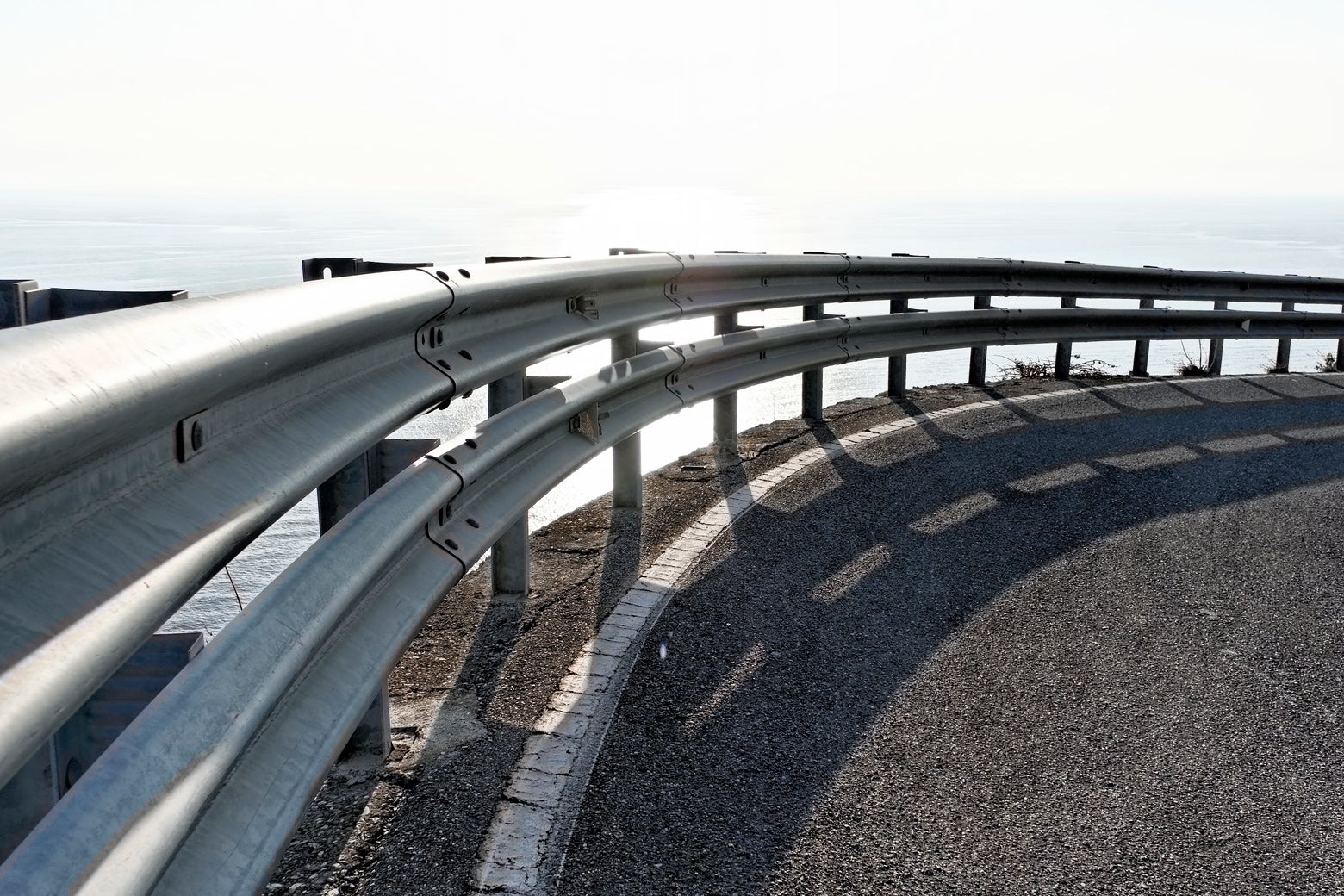There was a discussion a couple of years ago around gasoline taxes and how they are supposed to pay for roadway maintenance. The question came up about EVs. There were discussions about how to include EVs in the taxation system so they would pay for their fair share of the road. One of the options was to impose a tax attached to your vehicle registration based upon the weight of the vehicle. The greater the weight, the more wear and tear it produces on the road surface. This might be one solution to the barrier problem, namely moving the extra cost to the reason for the extra cost.
The “problem” with that tax is that if it’s applied fairly, it gets very big very fast. The damage to the road goes up with weight, but not linearly. Not a square factor, either. Not even cube. It’s to the fourth power.
Start applying that to long haul trucks and the whole industry will be bankrupt in a month. The implication being that we are all subsidizing that industry with taxes on roads. Including that one trucker with a “who is John Galt?” sticker on the back.
That said, this is also a very good argument for improving cargo trains to the point where most long haul trucking goes away.
And frankly, I’m really ok with this.
Trains should be the backbone for shipping. They are WAY more fuel efficient, like 3 to 4x more efficient than shipping by truck. Rail requires far less maintenance. And there’s always the option install a 3rd rail and use electricity instead of fossil fuels to ship.
No reason the tax had to scale exactly to match the damage though. At least make it painful enough so people consider whether a larger vehicle is worth it.
What I’m suggesting is to ramp up the tax on roads over several years in order to pay for the initial outlay on new train infrastructure. Then you don’t need 90% of the trucking industry at all.
Which would be great for many other reasons.
Train infrastructure is being removed around the world - good luck convincing people to build more.
The fact is a train turns one trip into three trips - truck to the railway station, train to another station, truck to the final destination. That often adds days to what otherwise might be a 3 hour delivery - because trains are only cheap if you send about a hundred or so trucks full of cargo on a single trip.
Only really makes sense for really long trips but more and more of those are done by ship or airplane. Trucks aren’t going anywhere.
What if it’s not a larger vehicle, but transitioning from a petrol burning vehicle to an electric vehicle?
We don’t want to give people reasons to hold on to old combustion vehicles any longer than they have to, but the roads of course need to be made safe for passengers and pedestrians and wildlife, I agree.
If they hold on to their existing vehicle than thats just another upside. If they buy a new gasoline car instead of an EV this is bad. But EVs dont have to be insanely heavy if we stop the whole cars getting bigger and bigger and bigger and bigger crap. They will still be heavier than their gasoline counterpart but one solution might be 2 tax brackets: One for gasoline cars and one for evs that has the same taxation levels but allows for, lets say, 500kg more weight in them
Speaking of road tax, you know that bad-faith argument about how cyclists need to pay our “fair share?” Well, I would be happy to pay 1¢ for my 10 kg bicycle if everybody with a car had to pay fairly by weight4.
Maybe it’s because I don’t really know anyone passionate on either side of this issue, but I’ve never heard of this argument. I know you said it’s a bad faith argument, but I can’t really imagine what a cyclist’s fair share would be aside from maybe widening a road to add a bike lane lol
You see it a lot on in the comment sections of local newspapers or the city specific subs on Reddit.
Makes sense, that’s where my local NIMBYs hang too.
So much of that freight should be moved by rail.
Tax based on weight to 4th power would work if we nationalized railways like roads.
Only if rail can figure out their shit and hire enough workers and give them all time off. Too many train derailments from precision scheduled railroading.
Actually maintained rail shouldn’t have this problem, but the private companies like Norfolk Southern spend the minimum amount to keep them operational.
With a budget just a fraction of highway upkeep and expansion they should be able to be kept in good repair.
Why bother with maintenance when the EPA handles the cleanup?
Yeah, I think turning highways back into methods of travel instead of “rolling warehouses saving Walmart a few bucks not storing anything on site” is a good thing.
Long haul trucking shouldn’t exist.
As a truck driver, I would like to ask, how would you acquire all the “stuff” you have bought over the years? I am reasonably sure most of it was not produced locally to you. And the raw materials almost certainly aren’t locally sourced. Trucking and logistics generally has its issues, and you only have glimpsed a fraction of them, but it is absolutely necessary for modern society. Unless you’re proposing we kill off 2/3rds of humanity and go back to hunter-gatherer. Not a fan of that idea.
He’s proposing trains should do the ‘Long Haul’ portion.
Which have their own issues. Namely, to my knowledge, upfront cost and lack of flexibility. I’m sure there are others.
Here in the US, you are unlikely to find enough people willing to think far enough ahead for that to happen. Too many emotions guiding actions.
The cost has already been paid. Even small farming communities have rail line access that’s mostly been abandoned because the line owners switched business models.
As for flexibility, again, that’s mostly an issue with how rail line management has evolved. From shorter more frequent trains to ultra long infrequent trains. Mostly to cut the cost of staffing.
The solution is simple, nationalize the rail service. Put it under the USPS and have them figure out scheduling to optimize the speed of goods shipping.
The current state of the rail system is entirely due to the monopolistic nature of ownership. The incentive is to increase prices as much as possible while shipping to the fewest stops possible. Profit motives are in direct conflict with generalized shipping.
The reason trunking works today is the public nature of roads. Well, why shouldn’t rail lines be equally public? We practically gave the property away to the current rail owners with the notion it was for the public good… They’ve failed that.
But if the true costs were quantized in the formula and not just externalized maybe it would suddenly make more sense. After all, in the end, society pays for it no matter what.
Even if we put 100% of freight on trains, and expand the existing rail network 10x, the need for trucking infrastructure would not decrease by any significant amount. Trains can’t stop at every single business that needs freight, and trucks are still needed to get that freight from the railport to its destination (this is called “last mile” freight, but it can be up to a few hundred miles depending on where the nearest logistics hub is compared to the destination).
By the way, we already use trains significantly. Look up the intermodal logistics network. The general concept is smaller trucks pick up freight from different businesses, consolidate it in a single warehouse, then the freight gets put on full size trucks to move to the nearest railport and the trailer is loaded on a train which carries it as far as possible, then the reverse happens at the other end. The vast majority of freight movement uses this method.
You’ve moved away from the part which specifies long-haul trucking. To my understanding this is an area where trains are a reasonable solution.
Last mile coverage we also have room for improvement with much smaller vehicles, like bikes.
My point is that long haul is a very small minority of long-distance freight. Anything that can fly, does. Anything else will go on a train if a route exists (this is where rail expansion would help, but there are other problems with that we won’t address). The only freight that travels long-distance is truckloads that can’t fly (hazardous goods that are dangerous to put on a plane, or stuff like certain foods that could be damaged by the pressure changes in flight) AND doesn’t have a good train route to take. My cross-country routes were always stuff like fresh produce or other foods that would be damaged by the pressure. Everything else would travel a few states, but never from one coast to the other.
And you can’t put 3 full pallets on a bike, you’ll always need trucks to some extent.
Neither should lots of short haul trucking, more specifically drayage trucking, that industry sucks. We probably need to move more towards vans and stuff.
Oh well. I guess they’ll just have to go bankrupt then.
And now you starve. None of the stores will stay open long without them.
That should mean they don’t go bankrupt though. If their service is vital, people will pay for it even if the prices rise. It would mean an increase in prices for goods admittedly as the stores try to recoup the increased logistics costs, but intuitively I’d imagine the financial impact on the end customer wouldn’t be as much because they’re paying for the road upkeep either way, just via higher taxes in the current state and via increased prices in the new one.
That’s not a supply and demand thing though. There just wouldn’t be product to buy because there’s no way to get it to the stores. It’s less about the bankruptcy and more about availability.
I mean the supply and demand for the trucking companies. Shipping is a vital service, if it had high taxes, it would have to dramatically increase prices for their shipping service, but they shouldn’t go out of business because everyone else would still pay those dramatically high prices, because they’d have to
Think of the shareholders!
So? That money is still coming from somewhere. If the freight industry can’t afford to pay then it means we are subsiding them CURRENTLY. They by the very nature of capitalism deserve to go out of business
True but unfettered capitalism is a terrible model.
There was a discussion a couple of years ago around gasoline taxes and how they are supposed to pay for roadway maintenance.
I just want to point out, even if they’re supposed to, gas taxes do not pay for roadway maintenance, not by a long shot
Some states do exactly that, or did back in the day. 30-years ago in Oklahoma, an old 2-ton dump truck with an antique plate was $20, a new Corvette $600. I think Texas flipped that and charged by weight vs. value.
deleted by creator
And the heavy vehicles get classified as light cargo so are largely exempt from those taxes. They’re promoting and building heavy “cargo” vehicles specifically because they get exemptions for fuel efficiency and taxes (depending on location).
In the country I reside, everyone pays for the roads through income tax. Vehicle owners pay emissions tax. I think this is fair since everyone relies on the roads even if they never travel down a road themselves.
Every mile an EV drives is already taxed as we already tax electricity consumption. There is no reason to add a tax for something already taxed.
That depends on if the tax is sufficient to cover the societal costs of driving that mile or not. Not every use of electricity degrades public infrastructure to the same extent, so if the maintenance burden an EV adds is more than what the electricity tax brings in, then additional taxes to make up the difference would make sense.
Tldr most guard rails are designed to stop vehicles under 5000lbs. Passenger vehicles are starting to exceed that, and EVs can weight 30% more than ICE vehicles.
How about keeping the guard rails as they are and let the fat car drivers carry the risk?
Even US drivers are not quite heavy enough to make a significant difference here. This has to do with car battery weights.
Just get an even bigger car, it will keep you safe from those.
Canyonero!
The country-fried truck endorsed by clowns!
Somehow I hadn’t seen it before. Thanks!
Here is an alternative Piped link(s):
The country-fried truck endorsed by clowns!
Piped is a privacy-respecting open-source alternative frontend to YouTube.
I’m open-source; check me out at GitHub.
I mean… kind of?
10 or 20 years ago? I would never have driven an SUV and thought anyone in one is stupid.
Five or six years ago? I needed a new car and ended up getting a “crossover” (so basically a hatchback on a lift kit). Still tiny compared to a lot of the cars on the road but a lot bigger than what I ever expected to drive.
Because in a sedan (like my rental a few months back)? My head is literally at bumper level for a LOT of the vehicles on the road. And now we have shit like the cybertruck where the bumper is a jagged metal wedge. I have a lot of faith in modern safety specs but that is still terrifying. In my small suv? I am still grill height for a lot of trucks but at least I am not weaving around monster trucks in a clown car.
Don’t get me wrong. I very much enjoy the increased ground clearance and ability to haul an entire car worth of camping gear comfortably. But I also know that I am “never” going to go smaller. And… that is kind of the problem. People are dragged kicking and screaming because the alternative is to feel like you are going to die the next time someone decides they are going to ignore a red light.
I didn’t realize until now, but I’ve been very fortunate to be able to take the bus to work recently, and the lack of fear of other vehicles on the road is probably a huge contributor to how much better I feel after the commute. I have that anxiety ever-present in the back of my mind while driving a sedan.
That it’s a arms race doesn’t make it better for society as a whole. It sucks.
Agreed.
But also? I care a lot more about me and my loved ones than a nebulous “society”. And I am not going to drastically increase risk to me and my partner in the interest of standing on principle*. Especially when “society” continues to get giant pickup trucks on lift kits with fucking spikes for bumpers.
*: Although, I WILL be one of those weirdos who does a LOT of research on fuel economy and efficiency so that I can feel better about technically driving an SUV.
It’s honestly ridiculous. My sedan was totaled last year after being rear ended at a red light at maybe 5mph by a big fuck off truck. Minor cosmetic damage to their bumper, completely crushed the rear frame of my cat.
Thankfully, no one was hurt beyond bruising, which is the most important part.
Part of that is by design and is crumple zones. EVERYONE makes fun of “whiplash” but people really do underestimate the kind of injuries caused by even a simple rear ending. And if your car got that fucked, it was probably for a good reason.
Of course, then we also have assholes who want cars without crumple zones to drastically increase damage to other vehicles. But… yeah.
I’m aware, and I’m more than happy to trade my car for my neck in any situation.
The issue is the proliferation of big fuckoff trucks. Had it been another reasonably sized car, it likely would have been a simple bumper replacement for both cars. Instead, I’m out a car for a significant period of time in an area where doing anything without a car is essentially just not a thing.
I’m of the opinion that putting small cars way up in the air as CUVs ruins the driving so much it makes people worse drivers.
Or maybe it’s just that every CUV I see driving acts like they don’t know where they are or what they’re doing.
I think that more has to do with the cabin design.
I personally drive a Subaru Crosstrek which is literally a Subaru Imprezza on a lift kit. So I have good visibility and have gotten used to the blind spots that my frame creates and know to lean forward a bit when approach a roundabout or intersection to make sure a car isn’t coming in from the left at approximately the same speed as me. Same with changing lanes on the highway (and knowing that the headrests on my back seat completely block vehicles in my rearview mirror…).
That said, my rental a few months back (it might have been a Camry? I forget) had a HORRIBLE interior and my blindspots felt massive because so much of the frame obstructed my view. Some of it was that I only had two or three days to “get used to it” but the frame genuinely meant I could not see traffic when I was doing tighter merges on the highway. Again, I know that means I physically move in my seat but a lot of people never learn that or are used to “check your blindspot” just meaning looking slightly farther back when glancing at a mirror. So they kind of just start changing lanes and get honked at or suddenly see the vehicle they are about to pit maneuver and need to quickly swerve back.
Cunt Utility Vehicle???
You seem ambivalent about the topic. I understand your arguments, but I don’t agree with your solution. That doesn’t need to bother you. We probably have very different requirements for transportation.
I live in an area where I don’t need a car to get where I want to - bike, bus and train are sufficient. And I don’t normally need to transport so much that I need a car. And if I need a car I get a rental for a short time.
Sometimes I shake my head a little in disbelief because I find the trend towards more individual transportation within large cars concerning. But then again my lifestyle isn’t for everyone and who am I to judge? (But I’m entitled to my own opinion. ;)
Extremely few Americans live in a place where that is even possible. Few can afford to move to a place like that because they are so rare and desirable. Your comment is not helpful.
This is also a bugbear for me. Since even in countries with genuinely amazing public transportation (such as Japan), people who live in more rural or remote areas are still up a creek. You might have a bus but you basically have one or two routes per day and if you need to “head into town” at any other time… you need a car.
But there are various youtube channels by rich white people who live in some of the more expensive cities on earth that basically say “fuck the poor” under the guise of better city design. And… don’t get me wrong, living in a city with public transportation is amazing and America as a whole REALLY loves unwalkable towns. But there are always going to be situations where private transportation is needed (even if it a few cars that the entire town “shares”).
some of the more expensive cities on earth that basically say “fuck the poor” under the guise of better city design
You’ve got that backwards.
Those are great cities to live in which is why living there is expensive. Cause those cities can’t accommodate that many people.
The city design isn’t the problem. Scarcity of it is.
It wasn’t meant to deliver a solution. It’s an opinion (as in a piece of my point of view).
It’s just not the right way to go in my opinion. (And yes I understand the reasons why people choose what what they choose. )
Same here, drove hatchbacks and sedans until 5 years ago and now have a crossover. It was good for a bit but now these new pickups and SUV headlights are right in my face again. Thinking installing a suspension lift and larger profile tires in the future. I do not want to drive a giant rectangle and can carry extra cargo if needed on my roof rack or cargo basket.
That’s 3175 kg for non-free folk. My car has around 1600 kg. 7k pound car is a fat fat cow.
Swifts and Mirages can be under 900kg.
It’s the battery, and the support frame to carry the weight of the battery safely. Like it or not - cars are getting heavier.
It’s a big fat fucking truck or luxury suv with a battery. A normal sized electric car is a thing too, you know. Electrics will always need to be heavier than ice of same size and model, but that doesn’t mean it needs to weigh 3000kg. Car are growing heavier and bigger not just because of electrification, but because of growing fragile egos and growing fears in a vehicle arms race.
But muh big truck
The only solution is a bigger truck.
We need to get rid of the commie laws requiring special licensing (CDL, Communist driver’s license) for freedom trucks.
Yeah well let’s quit making 7000 pound consumer vehicles. Small EVs would be more efficient and better for the environment because they need less materials to build and and less energy to recharge.
Congratulations, the fossil fuel industry just put a hit on you
Yeah but I’d like to visit my family and the nearest charging station is halfway across the state
If you are unable to find a charging station at some point halfway across the state you’re either being too picky, or blind. I live in the middle of nowhere Maine and I can still find at least one electric vehicle charger per major town. Hell there is three of them in the town next over and it’s not even considered one of our highly populated towns. I thought the same that you did until I actually looked up where charging stations are located I was pleasantly surprized
I live in Wyoming, having been to Maine, yall have an amazing and beautiful state but your definition of bumfuck no where is lacking. I checked the EV map again the ENTIRE QUATER of the state I live in that doesn’t have a single charger is where my family lives. I down south near Colorado for reasons I don’t want to get into right now but I want to be able to actually visit my family without having to take a plane between the two airports in Wyoming.
yea looking at wyoming I can see there is defo a lack of EV stations, it looks like for southern wyoming the longest stretch is between rock springs and Lareme, but that’s mostly if you lack the ability to use super chargers. I can see how it would be a pain to use an EV in that case, doable but it would stretch it a little further than i would be comfortable with as well. That being said you would never catch me driving 3 hours one way to visit someone anyway lmao
Plus, it’s Wyoming. Famously the least densely populated state. That comes with some associated costs.
The benefits are great though, people leave you alone and living here is cheap
Couldn’t pay me to live that far from an ocean. Or good internet.
that’s really interesting! I never really thought about how much weight the EVs haul around - and i imagine that the NTSB or whomever is actually responsible for guard rails didnt either. of course, guard rails dont do much for delivery vans or semi trucks - those both weigh in excess of 10,000 lbs. perhaps they’re not considered due to commercial vehicle regulations?
Sounds only bad for people driving obese cars, which is good from my perspective.
EVs are significantly heavier than ICE cars. That’s why this is a problem. The Rivian R1S is over 8,000 lbs.
The Rivian is absurd. What percent of Americans can even afford one? And what percent need one? This is why a tax on weight would be effective.
Sure the R1s are large, but R2 and R3 are much more reasonably sized and are planned to be lower priced. It seems that these new EV companies like to go with fewer of their higher end cars in the beginning to fund the production of the larger volume, more economic models later.
No, electric SUVs and other obese models are heavier. There’s plenty of EVs that are lighter than ICE cars.
Not than an equivalent ICE car. Sure you can make a subcompact EV, but it’s either gonna have no range, or weigh more than a Nissan Versa.
I mean, I never talked about just EVs. ICEs also have become way too big and consequently heavy over the decades. As far as I’m concerned, fuck cars in general.
So long as your perspective isn’t on the other side of these whales, than yes.
There was an article attached the post. Take a look
Sounds like A Nice Morning Drive. As noted in the archived page above, that story inspired the song Red Barchetta by the band Rush.

Seems like we need some regulation for maximum car weight to be. It’s a safety thing now
Apparently the author (and some of you as well) haven’t heard about 80,000lb tractor trailers…
You mean those commercial vehicles that need a different licence?
My first car had a curb weight of 2400 lbs. It’s absurd how fucking huge these planet-destroying, environment destroying, life destroying monstrosities have become.
Simple, if you buy a car that’s too heavy for the existing infrastructure, you either pay for the improved infrastructure or take the risk yourself. The minivan that I drive the kids in is only 4,300 lb. If you’re driving something heavier than that then, best of luck. I expect that if I’m driving a camper, and I fall off the road, I’m just done. Game over.
I don’t expect infrastructure to adapt to the minority. That’s not what it’s for.
what about trucks? should these rails not work for big trucks? or are trucks a minority?
edit: trucks like the ones that transport goods not rednecks
Trucks are commercial vehicles. People driving commercial vehicles should be professionals and we should have required a commercial class c license for all light duty pickup trucks or SUVs. Anything that gets an emissions credit so they can have lower MPG for being a commercial vehicle should also be classed as a commercial vehicle for licensing purposes.
Seems like we need some regulation for maximum car weight to be. It’s a safety thing now
…and yet I don’t feel even a bit sad. What could this mean ?
You’re a psychopath?
I say we change nothing and let evolution do her thing
You mean protect those inside the 7+ ton vehicles and to hell with anyone else?
If you haven’t read sir Darwin as of late, I think you should consider another look.




















